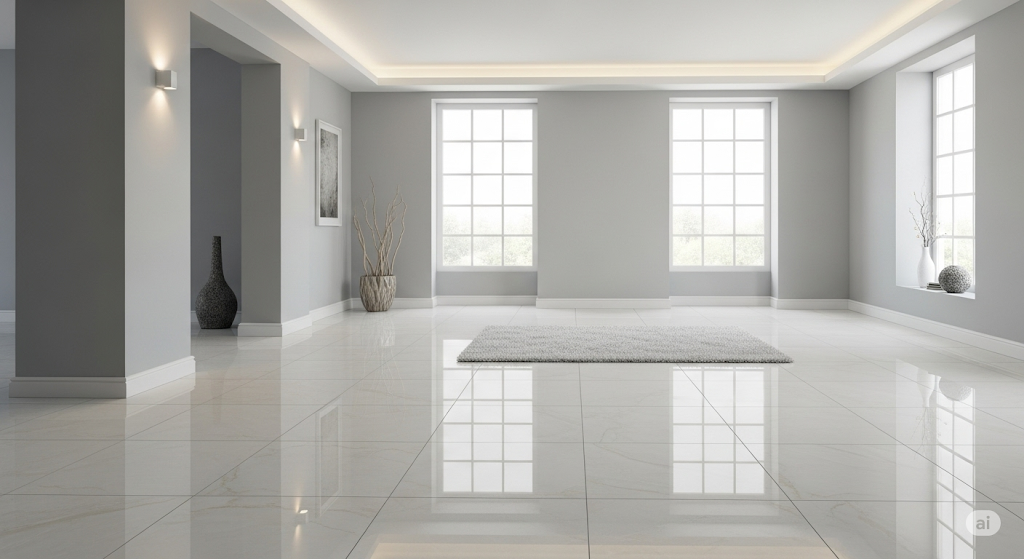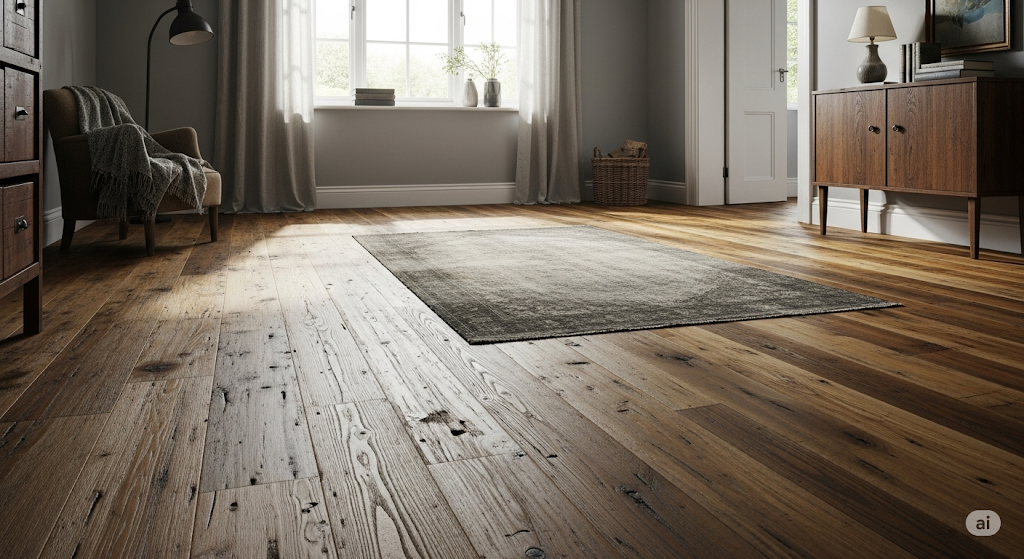As someone who’s helped countless homeowners choose the perfect flooring, I know it’s one of the biggest decisions you’ll make for your home. The right floors don’t just set the tone for your decor. They also need to stand up to everyday life, whether you have kids, pets, or heavy foot traffic.
Over the years, I’ve seen some floors age beautifully, while others show wear far too soon. That’s why I put together this guide to the 15 most durable flooring options that truly stand the test of time. If you’re looking for a floor that can take a beating and still look amazing, these are the options I recommend most often.

1. Porcelain Tile
Porcelain tile is my top pick when durability is the top priority. It’s harder and denser than ceramic tile, making it highly resistant to chips, cracks, and water damage. Perfect for bathrooms, kitchens, entryways, and mudrooms, porcelain can handle years of heavy use. It’s also easy to clean and comes in countless styles, including ones that mimic stone or wood.
2. Solid Hardwood
You can’t beat the timeless beauty and longevity of solid hardwood. With proper care, hardwood floors can last for generations. The key is choosing a tough species like oak, maple, or hickory, which resist dents and scratches better than softer woods like pine. When your floors start showing their age, you can sand and refinish them to restore their original luster—a huge advantage over many other flooring types.
3. Luxury Vinyl Plank (LVP)
Luxury vinyl plank has come a long way and is now one of my go-to recommendations for families who want style and durability. High-quality LVP mimics the look of wood or stone but offers exceptional resistance to scratches, dents, and moisture. It’s nearly waterproof, making it perfect for kitchens, bathrooms, or basements. Plus, it’s softer underfoot than tile or stone.
4. Engineered Hardwood
Engineered hardwood combines the beauty of real wood with increased stability. Its layered construction resists warping better than solid wood in humid environments, making it a smart choice for finished basements or homes in areas with big temperature swings. Look for engineered planks with a thick wear layer so they can be refinished at least once.
5. Natural Stone
Marble, granite, slate, and travertine floors offer unparalleled durability, plus they’re stunning. While natural stone requires some maintenance, it can last a lifetime when properly sealed and cared for. I’ve seen stone floors look even better decades later as they develop a beautiful patina.
6. Terrazzo
Terrazzo might not be the first flooring you think of, but it’s incredibly tough. Made from chips of marble, quartz, or glass embedded in cement or epoxy, terrazzo resists stains, scratches, and heavy foot traffic. It’s a popular choice for airports and museums for a reason, and it looks amazing in modern homes.
7. Bamboo
Not only is bamboo eco-friendly, but strand-woven bamboo is also one of the hardest flooring materials available. It’s denser than many hardwoods and stands up well to pets and kids. Bamboo’s unique grain gives it a modern, stylish look while offering durability and sustainability.
8. Concrete
For an ultra-durable, industrial look, polished concrete floors are hard to beat. Properly sealed concrete resists moisture, scratches, and stains. It’s ideal for modern spaces, basements, or even main living areas if you’re going for a contemporary vibe. Concrete can also be stained or dyed for unique colors and finishes.
9. Laminate
Many people are surprised to hear that quality laminate floors can be incredibly durable. The key is buying a high-quality product with a thick wear layer and a strong core. Laminate resists scratches better than many real woods, making it a great choice for busy households. Just be careful with water, as most laminates don’t like prolonged exposure to moisture.
10. Cork
Cork floors are resilient and surprisingly tough. While softer than tile or stone, cork has a natural springiness that helps it resist dents from dropped objects. Cork is also warm underfoot and reduces noise. These are a big plus in bedrooms or playrooms. With proper sealing, cork can handle moderate moisture, too.
11. Quarry Tile
Quarry tile is an unglazed ceramic tile made from natural clay. It’s a favorite in commercial kitchens for its slip resistance and ability to handle heavy traffic. In homes, quarry tile is perfect for mudrooms or outdoor patios, offering rustic charm and unmatched durability.
12. Linoleum
Linoleum might sound old-fashioned, but modern linoleum is nothing like the sheets of the past. Made from natural materials like linseed oil, cork dust, and wood flour, linoleum is tough, eco-friendly, and resistant to scuffs. It’s perfect for kitchens, family rooms, and areas with lots of activity.

13. Reclaimed Wood
I’m a big believer in reclaimed wood floors. Not only do they bring unique character, but old-growth wood often has tighter grain and greater density than many modern hardwoods, making it surprisingly durable. Choosing reclaimed flooring is also a great way to add history to your home and reduce environmental impact.
14. Rubber Flooring
Once reserved for gyms, rubber flooring is becoming more popular in homes, especially in laundry rooms, home gyms, or kids’ play areas. Rubber is nearly indestructible, comfortable underfoot, and slip-resistant. It also absorbs noise and comes in a variety of colors and textures.
15. Epoxy Coatings
For garages or basements, an epoxy-coated concrete floor is a game-changer. Epoxy creates a hard, glossy finish that resists oil stains, chemicals, and abrasions. It’s easy to clean, and newer formulas come in stunning colors or metallic finishes that can transform utilitarian spaces into stylish extensions of your home.
Choosing the Right Durable Flooring for Your Needs
I always tell clients that durability isn’t just about hardness, and it’s also about how a floor performs in your specific environment. Here are a few factors I encourage homeowners to consider:
- Moisture: If your home is in a humid climate or you’re flooring a kitchen, bath, or basement, water resistance is critical. Porcelain tile, LVP, concrete, and sealed natural stone are all excellent moisture-resistant options.
- Pets and Kids: For homes with claws and toys, scratch resistance matters. Bamboo, LVP, high-quality laminate, and engineered hardwoods with durable finishes tend to fare best.
- Maintenance: Some durable floors, like stone or hardwood, require periodic sealing or refinishing. If you want a truly low-maintenance option, consider porcelain tile, luxury vinyl, or laminate.
- Comfort and Noise: Hard surfaces can be tough on feet and noisy in busy homes. Cork, rubber, and bamboo offer more cushioning and sound absorption without sacrificing durability.
Why Investing in Durability Pays Off
It can be tempting to choose the cheapest flooring option if you’re on a budget, but I always remind homeowners that durable floors often pay for themselves. Materials that resist wear, water, and damage need less repair and replacement, saving you money and hassle in the long run.
Plus, durable floors add value to your home. When it comes time to sell, buyers appreciate the look and reassurance of long-lasting, well-maintained flooring. I’ve seen homes with quality floors sell faster and for higher prices than those with worn or low-quality flooring.
If you choose to install tile flooring in your home, you know that grout can become dirty relatively quickly. In this case, I have the perfect solution for you. Here’s an Electric Spin Scrubber with a Long Handle.
If you liked this article, here’s what to read next: Top 9 Design Ideas That Were Doomed from the Start